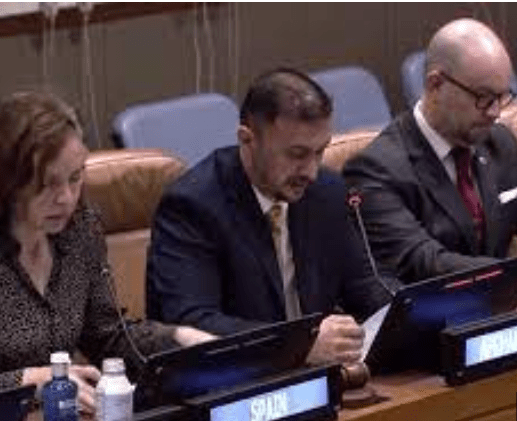Concerns about terrorism are raised by a UN event centered on Afghanistan.

The Islamic Emirate disputed the existence of terrorist organizations in Afghanistan once again.
Concerns about the existence of terrorism in Afghanistan were expressed by attendees at a UN seminar scheduled to examine the situation there.
The Afghanistan Policy Lab of the Princeton School of Public and International Affairs (SPIA), the Counter Extremism Project (CEP), and the International Institute for Justice and the Rule of Law (IIJ) attended the event on Thursday, along with the Permanent Missions of Afghanistan, Canada, and Spain.
The conference’s theme was “Tackling the Multiplicity of Security Challenges in Taliban-run Afghanistan and Neighboring Countries: Terrorism, Organized Crime, Human Rights, and Humanitarian Assistance.”
“The growing concern regarding the presence of more than 20 terrorist groups and foreign terrorist fighters in Afghanistan—the relocation of TTP or Tehreek-e-Taliban Pakistan to northern provinces of Afghanistan and the ensuing security threats and challenges posed to the world, region, and Afghanistan, and it alarms that Afghanistan is becoming once again a terrorist hub despite the Taliban’s persistent denial,” said Naseer Ahmad Faiq, the Chargé d’Affaires of Afghanistan.
In “no case,” according to Ana Jiménez de la Hoz, deputy permanent representative of the Kingdom of Spain to the UN, could Afghanistan serve as a base for terrorist organizations.
“Since terrorism can have a very negative knock-on effect in the region, we as Spain and the European Union (will) enhance our counter-terrorism measures in this regard,” she added.
The Islamic Emirate, meanwhile, denied the existence of terrorist organizations in Afghanistan once again, said that the country is generally secure, and committed to make measures to combat terrorism.
“There is cause for worry in this respect. According to Zabiullah Mujahid, spokesperson for the Islamic Emirate, “our strategy is to not allow Afghan soil to be used against others but instead focus on economic cooperation, stability, and peace here.”
In a joint statement from the 37th Working Group on Afghanistan meeting held at the CSTO Ministerial Council in April of this year, the attendees stated that they had “noted the persistence of unfavorable trends in the security situation, including the growth of terrorist and drug threats emanating from the territory of this country.”






